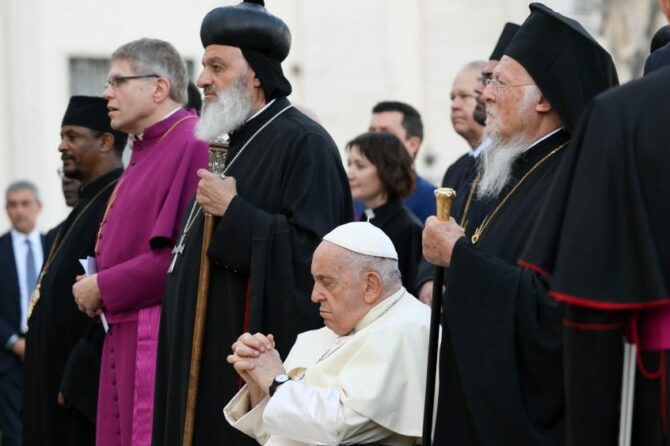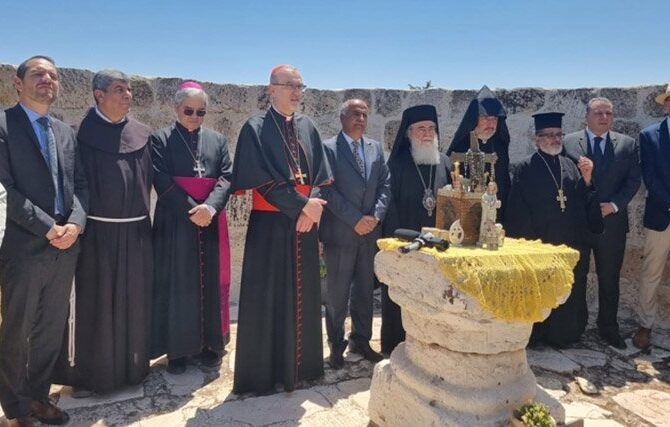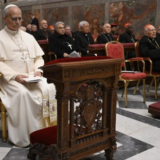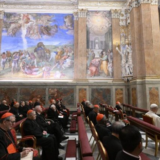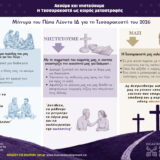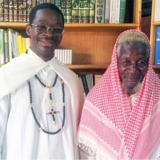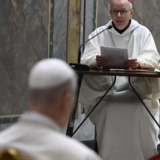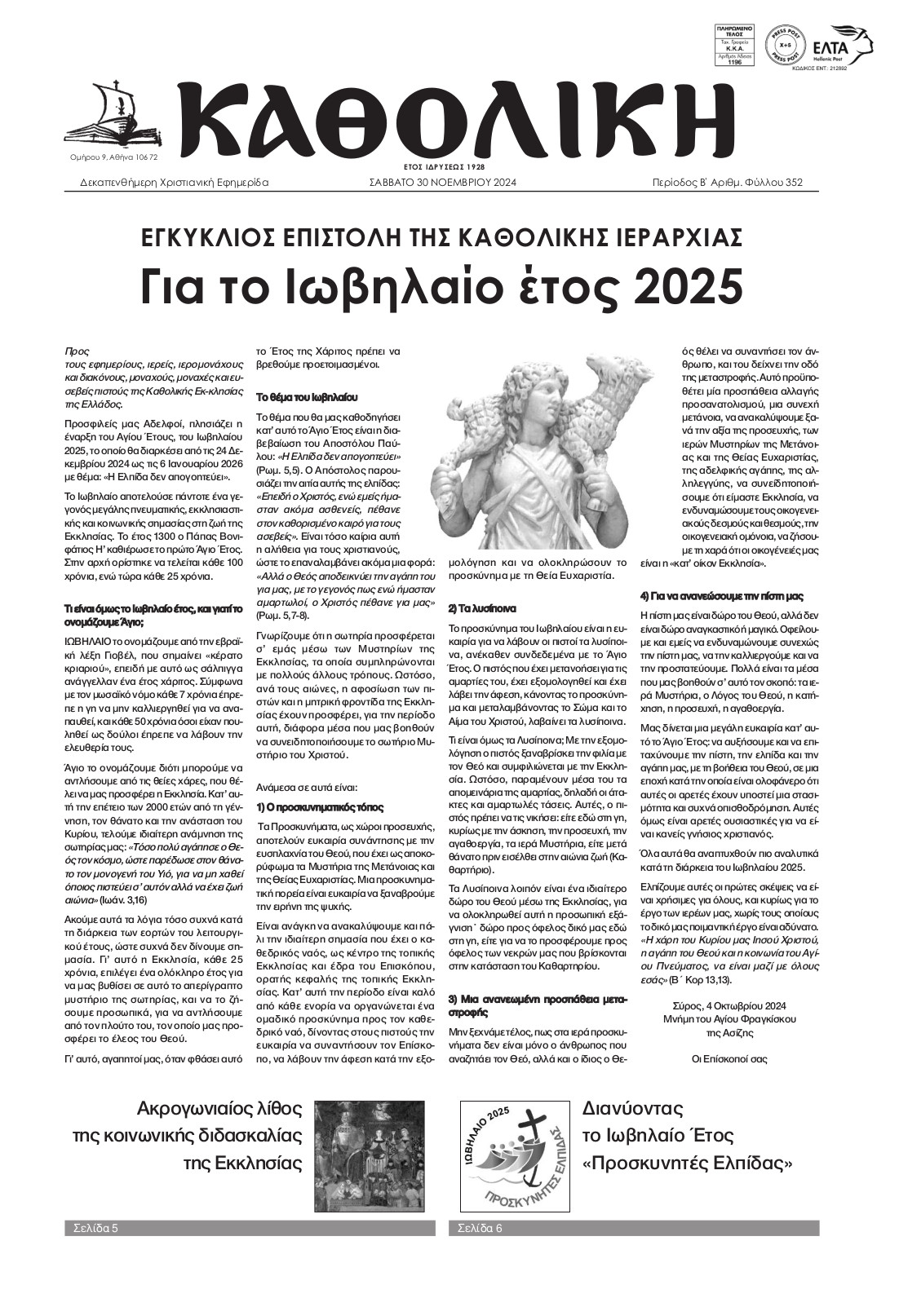
HOMILY OF THE HOLY FATHER POPE FRANCIS
Saint Peter's Square
Tuesday, 19 March 2013
Solemnity of Saint Joseph
Dear Brothers and Sisters,
I thank the Lord that I can celebrate this Holy Mass for the inauguration of my Petrine ministry on the solemnity of Saint Joseph, the spouse of the Virgin Mary and the patron of the universal Church. It is a significant coincidence, and it is also the name-day of my venerable predecessor: we are close to him with our prayers, full of affection and gratitude.
I offer a warm greeting to my brother cardinals and bishops, the priests, deacons, men and women religious, and all the lay faithful. I thank the representatives of the other Churches and ecclesial Communities, as well as the representatives of the Jewish community and the other religious communities, for their presence. My cordial greetings go to the Heads of State and Government, the members of the official Delegations from many countries throughout the world, and the Diplomatic Corps.
In the Gospel we heard that “Joseph did as the angel of the Lord commanded him and took Mary as his wife” (Mt 1:24). These words already point to the mission which God entrusts to Joseph: he is to be the custos, the protector. The protector of whom? Of Mary and Jesus; but this protection is then extended to the Church, as Blessed John Paul II pointed out: “Just as Saint Joseph took loving care of Mary and gladly dedicated himself to Jesus Christ’s upbringing, he likewise watches over and protects Christ’s Mystical Body, the Church, of which the Virgin Mary is the exemplar and model” (Redemptoris Custos, 1).
How does Joseph exercise his role as protector? Discreetly, humbly and silently, but with an unfailing presence and utter fidelity, even when he finds it hard to understand. From the time of his betrothal to Mary until the finding of the twelve-year-old Jesus in the Temple of Jerusalem, he is there at every moment with loving care. As the spouse of Mary, he is at her side in good times and bad, on the journey to Bethlehem for the census and in the anxious and joyful hours when she gave birth; amid the drama of the flight into Egypt and during the frantic search for their child in the Temple; and later in the day-to-day life of the home of Nazareth, in the workshop where he taught his trade to Jesus.
How does Joseph respond to his calling to be the protector of Mary, Jesus and the Church? By being constantly attentive to God, open to the signs of God’s presence and receptive to God’s plans, and not simply to his own. This is what God asked of David, as we heard in the first reading. God does not want a house built by men, but faithfulness to his word, to his plan. It is God himself who builds the house, but from living stones sealed by his Spirit. Joseph is a “protector” because he is able to hear God’s voice and be guided by his will; and for this reason he is all the more sensitive to the persons entrusted to his safekeeping. He can look at things realistically, he is in touch with his surroundings, he can make truly wise decisions. In him, dear friends, we learn how to respond to God’s call, readily and willingly, but we also see the core of the Christian vocation, which is Christ! Let us protect Christ in our lives, so that we can protect others, so that we can protect creation!
The vocation of being a “protector”, however, is not just something involving us Christians alone; it also has a prior dimension which is simply human, involving everyone. It means protecting all creation, the beauty of the created world, as the Book of Genesis tells us and as Saint Francis of Assisi showed us. It means respecting each of God’s creatures and respecting the environment in which we live. It means protecting people, showing loving concern for each and every person, especially children, the elderly, those in need, who are often the last we think about. It means caring for one another in our families: husbands and wives first protect one another, and then, as parents, they care for their children, and children themselves, in time, protect their parents. It means building sincere friendships in which we protect one another in trust, respect, and goodness. In the end, everything has been entrusted to our protection, and all of us are responsible for it. Be protectors of God’s gifts!
Whenever human beings fail to live up to this responsibility, whenever we fail to care for creation and for our brothers and sisters, the way is opened to destruction and hearts are hardened. Tragically, in every period of history there are “Herods” who plot death, wreak havoc, and mar the countenance of men and women.
Please, I would like to ask all those who have positions of responsibility in economic, political and social life, and all men and women of goodwill: let us be “protectors” of creation, protectors of God’s plan inscribed in nature, protectors of one another and of the environment. Let us not allow omens of destruction and death to accompany the advance of this world! But to be “protectors”, we also have to keep watch over ourselves! Let us not forget that hatred, envy and pride defile our lives! Being protectors, then, also means keeping watch over our emotions, over our hearts, because they are the seat of good and evil intentions: intentions that build up and tear down! We must not be afraid of goodness or even tenderness!
Here I would add one more thing: caring, protecting, demands goodness, it calls for a certain tenderness. In the Gospels, Saint Joseph appears as a strong and courageous man, a working man, yet in his heart we see great tenderness, which is not the virtue of the weak but rather a sign of strength of spirit and a capacity for concern, for compassion, for genuine openness to others, for love. We must not be afraid of goodness, of tenderness!
Today, together with the feast of Saint Joseph, we are celebrating the beginning of the ministry of the new Bishop of Rome, the Successor of Peter, which also involves a certain power. Certainly, Jesus Christ conferred power upon Peter, but what sort of power was it? Jesus’ three questions to Peter about love are followed by three commands: feed my lambs, feed my sheep. Let us never forget that authentic power is service, and that the Pope too, when exercising power, must enter ever more fully into that service which has its radiant culmination on the Cross. He must be inspired by the lowly, concrete and faithful service which marked Saint Joseph and, like him, he must open his arms to protect all of God’s people and embrace with tender affection the whole of humanity, especially the poorest, the weakest, the least important, those whom Matthew lists in the final judgment on love: the hungry, the thirsty, the stranger, the naked, the sick and those in prison (cf.Mt 25:31-46). Only those who serve with love are able to protect!
In the second reading, Saint Paul speaks of Abraham, who, “hoping against hope, believed” (Rom4:18). Hoping against hope! Today too, amid so much darkness, we need to see the light of hope and to be men and women who bring hope to others. To protect creation, to protect every man and every woman, to look upon them with tenderness and love, is to open up a horizon of hope; it is to let a shaft of light break through the heavy clouds; it is to bring the warmth of hope! For believers, for us Christians, like Abraham, like Saint Joseph, the hope that we bring is set against the horizon of God, which has opened up before us in Christ. It is a hope built on the rock which is God.
To protect Jesus with Mary, to protect the whole of creation, to protect each person, especially the poorest, to protect ourselves: this is a service that the Bishop of Rome is called to carry out, yet one to which all of us are called, so that the star of hope will shine brightly. Let us protect with love all that God has given us!
I implore the intercession of the Virgin Mary, Saint Joseph, Saints Peter and Paul, and Saint Francis, that the Holy Spirit may accompany my ministry, and I ask all of you to pray for me! Amen.

OMELIA DEL SANTO PADRE FRANCESCO
Piazza San Pietro
Martedì, 19 marzo 2013
Solennità di San Giuseppe
Cari fratelli e sorelle!
Ringrazio il Signore di poter celebrare questa Santa Messa di inizio del ministero petrino nella solennità di San Giuseppe, sposo della Vergine Maria e patrono della Chiesa universale: è una coincidenza molto ricca di significato, ed è anche l’onomastico del mio venerato Predecessore: gli siamo vicini con la preghiera, piena di affetto e di riconoscenza.
Con affetto saluto i Fratelli Cardinali e Vescovi, i sacerdoti, i diaconi, i religiosi e le religiose e tutti i fedeli laici. Ringrazio per la loro presenza i Rappresentanti delle altre Chiese e Comunità ecclesiali, come pure i rappresentanti della comunità ebraica e di altre comunità religiose. Rivolgo il mio cordiale saluto ai Capi di Stato e di Governo, alle Delegazioni ufficiali di tanti Paesi del mondo e al Corpo Diplomatico.
Abbiamo ascoltato nel Vangelo che «Giuseppe fece come gli aveva ordinato l’Angelo del Signore e prese con sé la sua sposa» (Mt 1,24). In queste parole è già racchiusa la missione che Dio affida a Giuseppe, quella di essere custos, custode. Custode di chi? Di Maria e di Gesù; ma è una custodia che si estende poi alla Chiesa, come ha sottolineato il beato Giovanni Paolo II: «San Giuseppe, come ebbe amorevole cura di Maria e si dedicò con gioioso impegno all’educazione di Gesù Cristo, così custodisce e protegge il suo mistico corpo, la Chiesa, di cui la Vergine Santa è figura e modello» (Esort. ap. Redemptoris Custos, 1).
Come esercita Giuseppe questa custodia? Con discrezione, con umiltà, nel silenzio, ma con una presenza costante e una fedeltà totale, anche quando non comprende. Dal matrimonio con Maria fino all’episodio di Gesù dodicenne nel Tempio di Gerusalemme, accompagna con premura e tutto l'amore ogni momento. E’ accanto a Maria sua sposa nei momenti sereni e in quelli difficili della vita, nel viaggio a Betlemme per il censimento e nelle ore trepidanti e gioiose del parto; nel momento drammatico della fuga in Egitto e nella ricerca affannosa del figlio al Tempio; e poi nella quotidianità della casa di Nazaret, nel laboratorio dove ha insegnato il mestiere a Gesù.
Come vive Giuseppe la sua vocazione di custode di Maria, di Gesù, della Chiesa? Nella costante attenzione a Dio, aperto ai suoi segni, disponibile al suo progetto, non tanto al proprio; ed è quello che Dio chiede a Davide, come abbiamo ascoltato nella prima Lettura: Dio non desidera una casa costruita dall’uomo, ma desidera la fedeltà alla sua Parola, al suo disegno; ed è Dio stesso che costruisce la casa, ma di pietre vive segnate dal suo Spirito. E Giuseppe è “custode”, perché sa ascoltare Dio, si lascia guidare dalla sua volontà, e proprio per questo è ancora più sensibile alle persone che gli sono affidate, sa leggere con realismo gli avvenimenti, è attento a ciò che lo circonda, e sa prendere le decisioni più sagge. In lui cari amici, vediamo come si risponde alla vocazione di Dio, con disponibilità, con prontezza, ma vediamo anche qual è il centro della vocazione cristiana: Cristo! Custodiamo Cristo nella nostra vita, per custodire gli altri, per custodire il creato!
La vocazione del custodire, però, non riguarda solamente noi cristiani, ha una dimensione che precede e che è semplicemente umana, riguarda tutti. E’ il custodire l’intero creato, la bellezza del creato, come ci viene detto nel Libro della Genesi e come ci ha mostrato san Francesco d’Assisi: è l’avere rispetto per ogni creatura di Dio e per l’ambiente in cui viviamo. E’ il custodire la gente, l’aver cura di tutti, di ogni persona, con amore, specialmente dei bambini, dei vecchi, di coloro che sono più fragili e che spesso sono nella periferia del nostro cuore. E’ l’aver cura l’uno dell’altro nella famiglia: i coniugi si custodiscono reciprocamente, poi come genitori si prendono cura dei figli, e col tempo anche i figli diventano custodi dei genitori. E’ il vivere con sincerità le amicizie, che sono un reciproco custodirsi nella confidenza, nel rispetto e nel bene. In fondo, tutto è affidato alla custodia dell’uomo, ed è una responsabilità che ci riguarda tutti. Siate custodi dei doni di Dio!
E quando l’uomo viene meno a questa responsabilità di custodire, quando non ci prendiamo cura del creato e dei fratelli, allora trova spazio la distruzione e il cuore inaridisce. In ogni epoca della storia, purtroppo, ci sono degli “Erode” che tramano disegni di morte, distruggono e deturpano il volto dell’uomo e della donna.
Vorrei chiedere, per favore, a tutti coloro che occupano ruoli di responsabilità in ambito economico, politico o sociale, a tutti gli uomini e le donne di buona volontà: siamo “custodi” della creazione, del disegno di Dio iscritto nella natura, custodi dell’altro, dell’ambiente; non lasciamo che segni di distruzione e di morte accompagnino il cammino di questo nostro mondo! Ma per “custodire” dobbiamo anche avere cura di noi stessi! Ricordiamo che l’odio, l’invidia, la superbia sporcano la vita! Custodire vuol dire allora vigilare sui nostri sentimenti, sul nostro cuore, perché è proprio da lì che escono le intenzioni buone e cattive: quelle che costruiscono e quelle che distruggono! Non dobbiamo avere paura della bontà, anzi neanche della tenerezza!
E qui aggiungo, allora, un’ulteriore annotazione: il prendersi cura, il custodire chiede bontà, chiede di essere vissuto con tenerezza. Nei Vangeli, san Giuseppe appare come un uomo forte, coraggioso, lavoratore, ma nel suo animo emerge una grande tenerezza, che non è la virtù del debole, anzi, al contrario, denota fortezza d’animo e capacità di attenzione, di compassione, di vera apertura all’altro, capacità di amore. Non dobbiamo avere timore della bontà, della tenerezza!
Oggi, insieme con la festa di san Giuseppe, celebriamo l’inizio del ministero del nuovo Vescovo di Roma, Successore di Pietro, che comporta anche un potere. Certo, Gesù Cristo ha dato un potere a Pietro, ma di quale potere si tratta? Alla triplice domanda di Gesù a Pietro sull’amore, segue il triplice invito: pasci i miei agnelli, pasci le mie pecorelle. Non dimentichiamo mai che il vero potere è il servizio e che anche il Papa per esercitare il potere deve entrare sempre più in quel servizio che ha il suo vertice luminoso sulla Croce; deve guardare al servizio umile, concreto, ricco di fede, di san Giuseppe e come lui aprire le braccia per custodire tutto il Popolo di Dio e accogliere con affetto e tenerezza l’intera umanità, specie i più poveri, i più deboli, i più piccoli, quelli che Matteo descrive nel giudizio finale sulla carità: chi ha fame, sete, chi è straniero, nudo, malato, in carcere (cfr Mt25,31-46). Solo chi serve con amore sa custodire!
Nella seconda Lettura, san Paolo parla di Abramo, il quale «credette, saldo nella speranza contro ogni speranza» (Rm 4,18). Saldo nella speranza, contro ogni speranza! Anche oggi davanti a tanti tratti di cielo grigio, abbiamo bisogno di vedere la luce della speranza e di dare noi stessi la speranza. Custodire il creato, ogni uomo ed ogni donna, con uno sguardo di tenerezza e amore, è aprire l’orizzonte della speranza, è aprire uno squarcio di luce in mezzo a tante nubi, è portare il calore della speranza! E per il credente, per noi cristiani, come Abramo, come san Giuseppe, la speranza che portiamo ha l’orizzonte di Dio che ci è stato aperto in Cristo, è fondata sulla roccia che è Dio.
Custodire Gesù con Maria, custodire l’intera creazione, custodire ogni persona, specie la più povera, custodire noi stessi: ecco un servizio che il Vescovo di Roma è chiamato a compiere, ma a cui tutti siamo chiamati per far risplendere la stella della speranza: Custodiamo con amore ciò che Dio ci ha donato!
Chiedo l’intercessione della Vergine Maria, di san Giuseppe, dei santi Pietro e Paolo, di san Francesco, affinché lo Spirito Santo accompagni il mio ministero, e a voi tutti dico: pregate per me! Amen.
